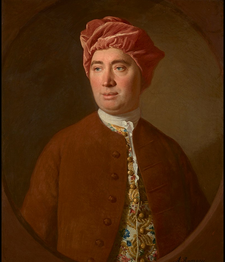
No; the book that influences me the most – that is, the book which, ever since I read it sixty-odd years ago, continues to influence my daily behavior: how I think, how I react to events, how I communicate with others – is Hume’s An Enquiry Concerning Human Understanding. I’ve read it through twice, and bits of it, especially in Sections 2-4, a few more times.
(Actually, as an influence, Hume runs neck-and-neck with Stendhal; Stendhal pulls the strings of my persona.)
Hume writes in a uniquely lucid prose.
Hume had no choice but to resort to the same-old same-old abstract terms that philosophers had been droning on about for centuries (and continue, of necessity, to drone on about). Reading most other philosophers – including the really great ones, Berkeley, Locke, Descartes (in translation), even Russell – is an often difficult progress through a series of interesting (I wouldn’t be reading it, otherwise) formulations. These formulations become complicated – sometimes to the point where they become too hard for me to understand – by the fact that, as the writer’s thoughts deepen, the meanings of the basic terms of those formulations change.
Hume, writing clearly, simply, allows no slippage in the definitions of his subject matter. He painstakingly refines his terms as he goes along, instead of all-of-a-sudden referring to them as if the reader had worked out that the preceding argument had redefined them. Hume is patient, genial, witty, but in a low key, and politely (that is, with a gentle, apologetic irony) self-deprecatory. He is a pleasure to read.
However, not until I heard Carl Manchester’s reading of An Enquiry Concerning Human Understanding did I realize what makes Hume’s style so accessible and comfortable: it is conversational.
This is the most wonderful audio presentation of a philosophical work that I can imagine.
Manchester reading Hume sounds like someone thinking out loud to a close friend. At a comma, Manchester pauses, as if seeking the best way to put what he has to say next. He modulates his manner, his mood, to match what he is reading. Ideas which Hume expected his reader to share, Manchester expresses in an easy, intimate lilt; ideas which might have taken Hume’s reader aback, Manchester’s presents with a deferential patience, yet also with a courteous insistence.
Listening to Manchester reading Hume is like listening to Hume himself. What’s more, it’s like listening to philosophy as spoken, not written, in the 18th century. Listen to Manchester read Hume and you know how serious conversation sounded (undoubtedly, there was plenty of unserious gabbing as well) – the tone, if not the flavor of it (did it have a Scottish burr?) –when Hume, Adam Smith, Lord Monboddo (called the founder of modern linguistics), Allan Ramsay, who painted this portrait of Hume, and other Edinburgh intellectuals got together at their club, The Select Society.
Take a listen, even if you think you’re not interested. Here’s a short section, with the nub of Hume’s skepticism about the rational basis of cause and effect.
 RSS Feed
RSS Feed